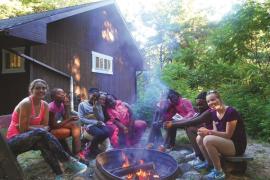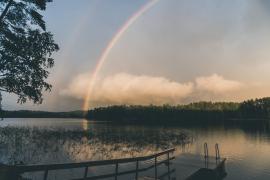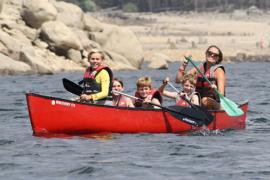 As head of school at Fort Worth’s K–12 Trinity Valley School, Gary Krahn, PhD, is a true believer in outdoor experiences for children and youth. Krahn served in the military for more than twenty-nine years (retiring in the grade of brigadier general), teaching math and pursuing multiple degrees, including a PhD in applied mathematics, along the way. He now leads Trinity Valley School — an independent, college-preparatory school with the mission of providing students with academic and character enrichment. Students at Trinity Valley School participate in the Trojan Outdoor Experience (TOE), which includes varying degrees of outdoor exploration, class trips, and activities based on students’ grade level. Krahn will be speaking at the 2013 ACA National Conference on the topic of “Learning Outside the Classroom.”
As head of school at Fort Worth’s K–12 Trinity Valley School, Gary Krahn, PhD, is a true believer in outdoor experiences for children and youth. Krahn served in the military for more than twenty-nine years (retiring in the grade of brigadier general), teaching math and pursuing multiple degrees, including a PhD in applied mathematics, along the way. He now leads Trinity Valley School — an independent, college-preparatory school with the mission of providing students with academic and character enrichment. Students at Trinity Valley School participate in the Trojan Outdoor Experience (TOE), which includes varying degrees of outdoor exploration, class trips, and activities based on students’ grade level. Krahn will be speaking at the 2013 ACA National Conference on the topic of “Learning Outside the Classroom.”
An Early Outdoor Education
Growing up, Krahn’s father was convinced his son could learn just as much (if not more) from camping as he could in the classroom. In lower school, Krahn’s father would take him out of school for a month each year to camp at state parks, teaching him how to be around new people, develop relationships, take care of himself, and confront new situations every day.
“He also taught me little leadership lessons when I was out there,” says Krahn. “I’d watch him when we were cooking, and he’d always be the last person to eat. He taught me to always take care of others.”
Perhaps the most important skills that Krahn gained outdoors were the ability to take risks (or be uncomfortable) and solve problems — two critical needs in our ever-changing world. “When we learn to be comfortable in uncomfortable situations — for example, hearing noises in the dark woods as a child or simply being in an unfamiliar setting — we become more confident leaders and make wiser decisions. People learn to turn to you when things get tough. They know you can find opportunities to make the situation better. You become a problem solver,” says Krahn.
Outdoor Experiences at Trinity Valley
In 2004, because of both his military experience and academic background, Krahn was asked to start a university in Afghanistan. Through this experience, he came to realize that K–12 education is the key to the future success of the U.S. After doing some consulting work and some research into both public and private education, Krahn received the opportunity to take the role of head at Trinity Valley School.
At Trinity Valley School, Krahn encourages outdoor experiences for students as a way to tap into diversity: “Research shows that being around people, places, or things that are different from you provides a remarkable opportunity to develop. Students need to grow and experience things beyond the classroom — that’s what pushes us to the outdoors.”
Often, students’ outdoor trips at Trinity Valley School are their first real opportunity to be outdoors overnight. They experience everything from the importance of being prepared (there are consequences in the outdoors if you’re not!) to gaining new perspectives on their classmates, community, and world. Certain students also develop a newfound confidence after successfully navigating a challenging situation — completing a ropes course or challenging hike, staying calm when there’s a snake on the road, or even helping a friend overcome a difficult task or fear.
Trinity Valley School and TOEWhen speaking about the philosophy of Trinity Valley School, Krahn says: “We really ascribe to computer scientist Alan Kay’s thought that ‘The best way to predict the future is to invent it.’ We position kids so they can shape the future. We want them to have the competence and confidence to solve problems they haven’t seen before. We want our graduates to be able to anticipate and respond to a rapidly changing world and become the best version of themselves.” To that end, Trinity Valley School uses tools such as TOE for character develop¬ment. TOE has the mission of using “outdoor activities to profoundly increase the respect . . . students have for themselves, each other, and the natural world.” Further, “each outing will provide the opportunity for students, individually and as a group, to practice overcoming adversity through skilled decision making.” The outdoor experiences vary with grade level: Grades 3–4: activities include group challenges, fossil hunting, archery, animal habitats, and expedition behavior Grades 5–8: activities include overnight trips, tent camping, rock climbing, kayak¬ing, journaling, and outdoor and wilderness ethics Grades 9–12: activities include environmental education, community service, student-led leadership opportunities with younger students, and summer explora¬tion trips across the globe Learn more at www.trinityvalleyschool.org/page.cfm?p=382. |
Working with Schools: Advice for Camp Professionals
 When asked what camp professionals could do to reach out to schools, Krahn’s answer is simple: “They just need to go visit.” He explains that the education community needs to know camps are interested in what they’re doing and want to be a part of the child’s complete development. Krahn is aware that this might be new territory for many camps but that camp professionals and school leaders alike must “get out of our comfort zones.” He insists that outdoor education opportunities contribute to “the blend of excellence that students need for true enrichment.”
When asked what camp professionals could do to reach out to schools, Krahn’s answer is simple: “They just need to go visit.” He explains that the education community needs to know camps are interested in what they’re doing and want to be a part of the child’s complete development. Krahn is aware that this might be new territory for many camps but that camp professionals and school leaders alike must “get out of our comfort zones.” He insists that outdoor education opportunities contribute to “the blend of excellence that students need for true enrichment.”
But beyond just visiting with school leadership, it’s important to be prepared. “Any science teacher would love a camp professional to say: ‘Here’s what we hope kids get out of being at camp.’ Explain what students will learn: the beauty of nature, the complexity of the natural world, elements of the animal kingdom, outdoor living skills, and so on.” It’s also helpful to point out how these things align with state curriculum standards.
In many cases, persistence will also be a critical factor in building camp-school partnerships. Krahn remembers his experience with Camp El Tesoro, a Camp Fire First Texas camp located in Granbury, Texas. Trinity Valley now partners with El Tosoro for outdoor programming, but it took a couple years of continued interaction with one of Camp Fire First Texas’ executive leaders, Ann Sheets (also the ex officio member of ACA’s national board), to get Trinity Valley on board. “Don’t give up after the first two years!” says Krahn.
Ultimately, camp and school profession¬als are teachers who share the common goal of educating children and youth. “Teachers not only pass down wisdom, but show kids that we can all make the world a better place. Part of that is showing kids different viewpoints of the world and helping them find their passion — and develop the attitude of ‘I’m here to learn.’ As my father used to say: ‘Our job is not to lead the horse to water or to make it drink. It’s to make the horse thirsty.’”
“Some kids find greater successes outdoors than in the classroom. Accomplishments in the classroom are just a small part of intelligence,” says Krahn. “We see students rise to the occasion in outdoor opportunities that the classroom does not provide. There’s something remarkable in every child. Our job is to create opportunities for students to thrive. And for many, outdoor experiences are not only developmental, but fun — which is truly the best way to learn.”
Cultivating GritSomething that interests Krahn regarding youth development and learning beyond classroom walls is the emerging research on grit. According to psychologist Angela Lee Duckworth, PhD, grit (persever¬ance, tenacity, and hard work) is a huge predictor of success. While talent and intelligence are also factors of success, it appears as though people who achieve at the highest levels are those who find their passion and don’t let it go when times get tough. So what can improve a person’s capacity for grit? According to Duckworth, personality traits (like grit) are relatively static, meaning they can be hard to change. However, Duckworth notes that experience and culture can influ¬ence one’s level of grit. Camp professionals can encourage grit in campers and visiting students by exposing them to an environment that praises and reinforces grit — and shows them that they can find success through perseverance even after a failure. To learn more about Angela Duckworth, visit www.sas.upenn.edu/~duckwort/. |
Additional ResourcesTrinity Valley School: www.trinityvalleyschool.org Camp El Tesoro Outdoor Education Programming: www.campfirefw.org/CampFire/Families/CampElTesoro/OutdoorEducation/tabid/184/Default.aspx “Going to Outdoor School: Talking the Talk,” by Brian Thomas, from the 2011 September/October Camping Magazine: www.ACAcamps.org/campmag/1109/going-outdoor-school-talking-talk “Raising the Bar: A Case for Quality Outdoor Education,” by Jim Parry, from the 2011 September/October Camping Magazine: www.ACAcamps.org/campmag/1109/raising-bar-case-quality-outdoor-education “Partnering with Schools: Understanding the Camp-School Connection,” by Danielle Timmerman and M. Deborah Bialeschki, PhD, from the 2010 September/October Camping Magazine: www.ACAcamps.org/campmag/1009/partnering-with-schools |
Julie Anderson is the communications editor at ACA.
Originally published in the 2013 January/February Camping Magazine



